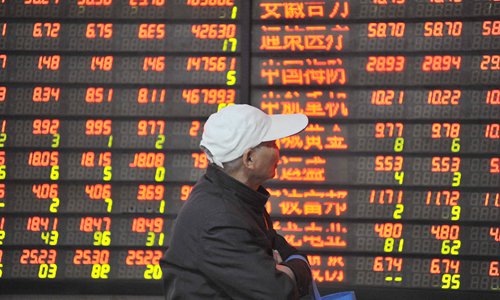HOME >> BUSINESS
Investors aren’t panicking over trade; financial markets generally stable, official says
Source:Global Times Published: 2019/5/28 21:13:41

An investor watches market performance at a brokerage in Nanjing, East China's Jiangsu Province on Tuesday. Photo: VCG
China Banking and Insurance Regulatory Commission (CBIRC) Chairman Guo Shuqing has stressed twice in interviews in the past three days that Chinese people have not panicked when domestic financial markets are burdened with pressure from the China-US trade war.
His comments show the government's attitude toward pressure from the trade war on the financial sector. The government won't use policy tools in the markets to offset the influence of the trade war, because the impact is not strong enough to damage China's self-stabilization system, said Dong Dengxin, director of the Finance and Securities Institute at the Wuhan University of Science and Technology.
"The comments will help to reassure investors and further stabilize the financial markets," he told the Global Times on Tuesday.
In an interview with China Central Television on Monday, Guo said that China's financial markets, including those for stocks, bonds and currencies, have been relatively stable so far this year.
"I believe the impact (of the trade war on domestic financial markets) will diminish further," he said in the interview.
"Frankly speaking, when the China-US trade friction broke out, Chinese people were not mentally prepared for the situation and the financial markets overreacted a little bit ... But after one year, people have realized that the situation is not very serious, and the actual impact of the (trade dispute) on the domestic economy is very limited," Guo said.
On Saturday, during the Tsinghua PBCSF Global Forum 2019 held in Beijing, a speech by Guo was made public. According to the speech, although the foreign exchange market has experienced some volatility in recent days, Chinese companies and the public have not shown any sign of panic.
"More and more people have realized that it's not feasible to gain profits via speculative foreign exchange trading. Nor is it safe to transfer financial assets abroad," Guo commented during the forum.
On Tuesday, the Shanghai Composite Index edged up by 0.61 percent to 2,909.91 points, while the Shenzhen Component Index rose by 0.62 percent to 9,035.69 points. The two bourses fluctuated only mildly in May after a steep decline in late April.
In particular, stocks plunged following US President Donald Trump's market-shocking tweet on May 5, in which he said that the US would raise tariffs on $200 billion of Chinese goods.
The yuan's exchange rate against the US dollar fell by 49 basis points to 6.8973 on Tuesday.
Dong said that so far there are no signs showing abnormal fluctuations on the financial markets.
"China's financial sector has the ability to adjust and stabilize itself, instead of relying on 'policy stimulus' to remain stable. I believe the government will keep its promise of financial opening-up and won't use policy intervention to cope with impact of the trade war," Dong said.
Posted in: MARKETS